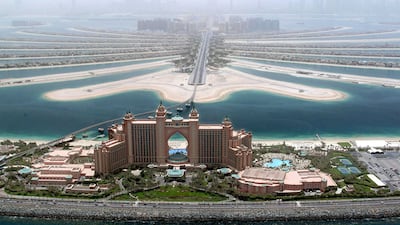Dubai’s reputation on the world stage as a city of glamour is well earned, on that we can all agree. But that is only one side of a city filled with history, intrigue and a melting pot of cultures.
Yet it was Dubai’s ultra-glamourous side that was the focus of the first episode of new BBC documentary Inside Dubai: Playground of the Rich, which aired in the UK on Monday evening, showcasing the city as an always-sunny tax-free haven where supercars, private jets and walk-in closets filled top to bottom with designer clothing are commonplace.
Following some of the city’s wealthiest residents is always going to be a draw for viewers. Who doesn’t like to see how the other half live? Even if it can be envy-inducing at times.
The first episode profiled Rashed Belhasa, 19, Dubai’s “richest teenager”, as he goes to get one of his many supercars wrapped and film the whole thing for his YouTube channel, of course. “I feel like every day is my birthday”, he tells the camera, as he chooses electric blue for his Rolls-Royce.
Elsewhere, we meet Indian businessman Abu Sabah, who has his name proudly inscribed on the facade of his house. “I’m proud of myself, yes,” he says, as he’s asked about it. “God has been very kind and I have achieved my goals – at a very early stage.”
Sabah owns the world’s most expensive number plate, which he purchased last year for a staggering $9 million. When asked if the number plate was worth more than the Rolls-Royce on which it sits, he replies: “Of course. The car is only worth $800,000.”
And then there’s socialite Sonia Pronk, who takes us through her wardrobe, which consists of more designer handbags than she is physically able to count and is estimated to be worth close to $4 million. “Are any of these fake?” she’s asked, a question that leaves her aghast.
We also meet Gaynor Scott, who, along with her millionaire businessman husband and their two children, splits her time between Dubai and the Channel Islands in the UK. She is throwing a welcome party for her new neighbours in Emirates Hills, with the help of her live-in chef and team of four Filipino staff.
The family then leaves for the UK via an $100,000 private jet – they like to avoid the crowds in the airport lounges, we are told.
It’s hard to look away, even if you want to at times. But it’s hardly a fair representation of Dubai.
The show takes the city’s 1 per cent and projects as if everyone who moves here lives such utterly lavish lifestyles. It seems to suggest that you are either a millionaire or a domestic worker, with little room in between.
Naturally, the extreme wealth showcased has got viewers’ backs up, with plenty of backlash on social media. And it feels as though that was the show’s aim all along.
One viewer called the show "tasteless".
Sure, if you come to Dubai you will see supercars and five-star hotels, just as you would on London’s Kings Road, or in just about any other global city, but if you scratch below the shiny, hard surface portrayed by this show, you will find an ordinary, day-to-day life enjoyed by many hard-working residents, too.


